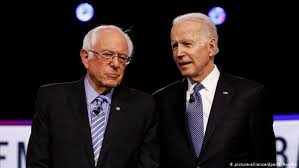WORLDVIEW: Has malicious capitalism opened the door for Bernie?

By Jonathan Power
Capitalism rules the world. Correct. But Bernie Sanders has his doubts about it. Good. It is a malicious system in many ways but as Winston Churchill might have said, it is better than all the alternatives. Nevertheless, it’s time overdue to tame the beast.
After the Second World War, the Western world did make a big effort to mitigate some of its worst effects. In the US there was the GI bill to help returning soldiers get started in life. Later, there was Medicaid for poorer people. In Europe, there was a widespread attempt to replicate the free health services pioneered by the Scandinavian countries and New Zealand.
Then in the 1980s came Thatcherism and Reaganism. Their governments set about a heavy-handed pruning of the social welfare safety net. Poverty rose dramatically. Fortunately for their people the governments of the rest of Europe, by and large, did not emulate the Anglo-Saxons.
President Bill Clinton and Prime Minister Tony Blair in the late 1990s introduced what they said was the “Third Way”- something between naked capitalism and over-demanding socialism. Clinton tried but failed, to fashion a fairer health system, although, paradoxically, he cut welfare payments for the poorest in the mistaken belief that this would drive the poor to find jobs. (Later he admitted his mistake.) In Britain, the child poverty rate plummeted.
2008 Recession
Then came the Great Recession of 2008. This indeed was the result of wicked capitalism. The crash of the big New York bank Lehman Brothers triggered a tsunami of bankruptcies, unemployment and increased poverty across the world. The bankers responsible got a government slap on the knuckles. The poor lost their jobs and saw their welfare payments cut. Their taxes went on rescuing the banks.
“Austerity” became the “in” political word. Germany used its economic muscle to push it down the throats of the weaker European economies- Greece, Spain, Italy, and Portugal in particular. Britain under the Conservative government embraced it with enthusiasm. The National Health Service became underfunded, welfare payments for the poor stagnated, libraries and nurseries were closed. Police were laid off in large numbers. Knife crime went up. In the US, President Donald Trump tried to eviscerate Barack Obama’s health reforms. The ugly, unacceptable, face of capitalism became the norm.
The ideas of the twentieth century’s greatest economist John Maynard Keynes asserted that in a time of recession the government should spend more- the reverse of what a household should do- were ignored except in Obama’s America, Sweden, Portugal, and Poland. They all had reasonable growth. Ironically, Trump has benefited from Obama’s Keynesianism which brought back growth to the US. Trump in his wisdom continued Obama’s economic policy. Hence the continuing growth and falling unemployment in the US. In most of Europe where austerity was practiced, it went up.
Over the years income distribution has worsened, the concentration of wealth in the bank accounts of the top 10% has become more pronounced than it has been since the days of the early Industrial Revolution. As LSE professor Branko Milanovic has written, “Since the late twentieth century, the share of capital income in total income has been rising- that is, an increasing portion of a country’s national income belongs to the profits made by big corporations and the already wealthy. A rising share of capital income in total income implies that capital and capitalists are becoming more important than labor and workers, and so they acquire more economic and political power”. This is a result of globalization, the weakening of trade unions and the flight from the developed world to the developing world of manufacturing jobs and wage stagnation.
Policies were fashioned with little or no thought for those who were on the receiving end of the hard edge of so-called progress. Needless to say, for those developing countries to which investment and jobs moved globalization was a good thing. But it should not have been done at the expense of industrial workers in declining industries. Western governments should have retrained these workers for newer jobs. But apart from in Scandinavia too little has been done. In America very, very little.
The problems are getting worse. The relatively new big tech industries have become the most adept companies at avoiding tax. In Ireland, for example, where Apple has its European headquarters, it has paid a minuscule annual tax, as low as 0.005% in some years. This is a common phenomenon. At home in the US, a number of major companies pay no corporate taxes at all. Individual rich individuals think dodging taxes is a competitive sport. An estimated 8% of the world’s household financial wealth is hidden in tax havens. Around the world, governments have been making their tax systems tilt towards the better off.
This inequality distorts democracy. Donald Trump, a well-known tax avoider, “bought” the presidency. Michael Bloomberg is trying to do it now. Around congresses and parliaments the world over a hoard of lobbyists working for well-to-do individuals and companies successfully seek legislation that works in their favor.
A soon to be published book, “Deaths of Despair” written by the Nobel prize-winning economist Angus Deaton and Anne Case, focuses in on why in the last few years life expectancies in the US has fallen after a century of increase. Over the last two decades among the poorer part of the white population deaths of despair from suicide, drug overdose and alcoholism have risen dramatically. They now claim hundreds of thousands of lives each year (Blacks and Latinos have suffered much less. Indeed, Blacks have progressed economically, socially and politically rather fast.) The American Dream, the authors say, is in decline. For the white working class, today’s America has become a land of broken families and few prospects.
The authors posit with a great deal of evidence that if one has a college degree all these problems are avoided. But for those who don’t life is “nasty, brutish and short”, to quote Thomas Hobbes, the seventeenth-century founder of modern political philosophy.
The authors blame the fast spread of opioid use (a derivative of opium), a phenomenon that has been encouraged by a handful of unscrupulous, greedy, drug companies. But this is only the tip of an iceberg on which sits the weakening position of workers, the growing power of corporations and, above all, (this is why Europe doesn’t suffer the same problem) a rapacious health care system that redistributes working-class wages into the pockets of the wealthy.
Capitalism, they write “which over two centuries has lifted countless people out of poverty is now destroying the lives of blue-collar America”.
It is time overdue for a socialist/social democrat to come to power in America. Will the poorer whites of America vote against their own economic interest as they did for Trump last time, for reasons of nationalism, ignorance, rage, and racism? That is the big question of our day. It would be a calamity for them if they did.





